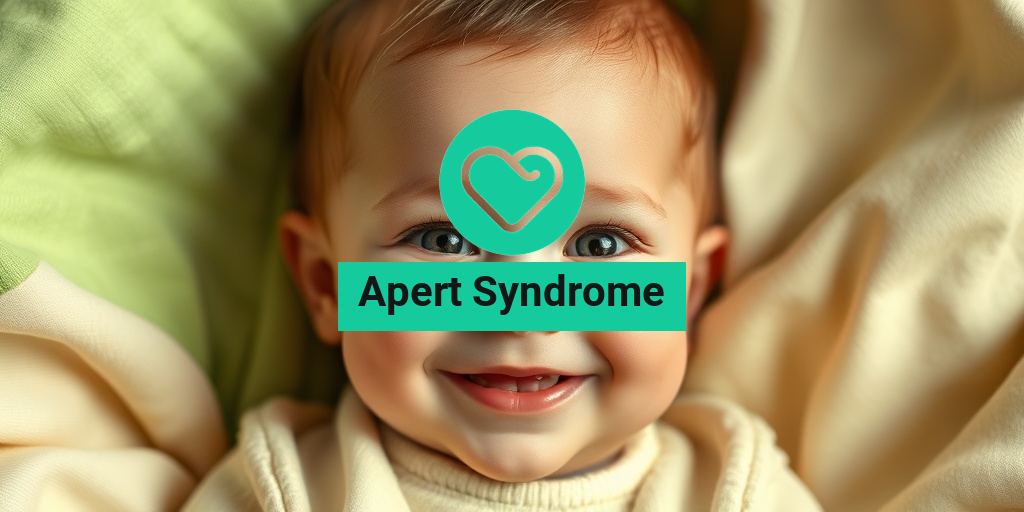What Is Apert Syndrome?
Apert Syndrome is a rare genetic disorder characterized by the premature fusion of certain skull bones, which affects the shape of the head and face. This condition is part of a group of disorders known as craniosynostosis syndromes. It was first described by Dr. Edward Apert in 1906, and it is estimated to occur in about 1 in 65,000 live births. The condition is caused by mutations in the FGFR2 or FGFR1 genes, which play a crucial role in the development of bones and tissues in the body.
Individuals with Apert Syndrome often exhibit a range of physical features and health challenges, which can vary significantly from person to person. The condition is typically diagnosed at birth or shortly thereafter, and early intervention is essential for managing its symptoms and improving quality of life.
Understanding the Genetic Basis
The genetic mutations associated with Apert Syndrome are usually spontaneous, meaning they occur randomly and are not inherited from parents. However, in some cases, the condition can be passed down through families. The mutations lead to abnormal signaling pathways that affect bone growth and development, resulting in the characteristic features of the syndrome.
Common Features of Apert Syndrome
Individuals with Apert Syndrome may present with a variety of features, including:
- Skull and Facial Abnormalities: The most noticeable characteristic is the shape of the head, which may appear elongated or flattened. The forehead may be prominent, and the eyes can be widely spaced.
- Hand and Foot Deformities: Many individuals have fusion of fingers and toes (syndactyly), leading to webbed hands and feet.
- Hearing Loss: Some individuals may experience hearing difficulties due to structural abnormalities in the ear.
- Dental Issues: Misalignment of teeth and other dental problems are common.
While these features are typical, the severity and combination of symptoms can vary widely among individuals with Apert Syndrome. This variability makes personalized treatment plans essential for each patient.
Apert Syndrome Symptoms
The symptoms of Apert Syndrome can be diverse and may affect various systems in the body. Understanding these symptoms is crucial for early diagnosis and intervention. Here are some of the most common symptoms associated with Apert Syndrome:
Physical Symptoms
As mentioned earlier, the physical manifestations of Apert Syndrome can include:
- Craniofacial Features: A prominent forehead, shallow eye sockets, and a beaked nose are common facial characteristics.
- Hand and Foot Anomalies: The fusion of fingers and toes can lead to difficulties with fine motor skills and mobility.
- Vision Problems: Strabismus (crossed eyes) and other vision issues may occur due to the positioning of the eyes.
Neurological Symptoms
Some individuals with Apert Syndrome may experience neurological challenges, including:
- Developmental Delays: Delays in reaching developmental milestones such as walking and talking can occur.
- Learning Disabilities: Some individuals may face challenges in learning and cognitive development.
Health Complications
In addition to the physical and neurological symptoms, individuals with Apert Syndrome may be at risk for various health complications, including:
- Respiratory Issues: Due to structural abnormalities, some individuals may have difficulty breathing.
- Cardiac Problems: Congenital heart defects can occur in some patients.
Early diagnosis and a multidisciplinary approach to treatment can significantly improve outcomes for individuals with Apert Syndrome. Treatment may involve surgery to correct craniofacial abnormalities, physical therapy, and ongoing medical care to address associated health issues.
For more information and resources on Apert Syndrome, consider visiting Yesil Health AI, where you can find evidence-based health answers tailored to your needs.
In conclusion, Apert Syndrome is a complex condition that requires careful management and support. By understanding its symptoms and features, families can better navigate the challenges and ensure their loved ones receive the care they need. 🌟

Apert Syndrome Causes
Apert Syndrome is a rare genetic disorder characterized by the fusion of certain skull bones, leading to a variety of physical and developmental challenges. Understanding the causes of Apert Syndrome is crucial for parents and caregivers, as it can help in managing the condition effectively.
Genetic Mutations
The primary cause of Apert Syndrome is a mutation in the FGFR2 or FGFR1 genes. These genes are responsible for encoding fibroblast growth factor receptors, which play a vital role in cell growth and development. When mutations occur, they can disrupt normal bone formation, particularly in the skull and face.
Inheritance Patterns
Apert Syndrome typically follows an autosomal dominant inheritance pattern. This means that only one copy of the mutated gene from an affected parent can cause the syndrome in their child. However, it’s important to note that most cases arise from new mutations, meaning they occur spontaneously and are not inherited from either parent.
Environmental Factors
While genetic mutations are the primary cause, some researchers are investigating whether certain environmental factors during pregnancy might contribute to the risk of Apert Syndrome. Factors such as maternal smoking, advanced paternal age, and exposure to certain medications or chemicals may play a role, although more research is needed to establish definitive links.
Apert Syndrome Diagnosis
Diagnosing Apert Syndrome involves a combination of clinical evaluation, imaging studies, and genetic testing. Early diagnosis is essential for effective management and intervention, which can significantly improve the quality of life for affected individuals.
Clinical Evaluation
The first step in diagnosing Apert Syndrome is a thorough clinical evaluation by a healthcare professional. This typically includes:
- Physical Examination: A detailed examination of the child’s physical features, including the shape of the head, face, and hands.
- Medical History: Gathering information about the family history of genetic disorders and any symptoms the child may be experiencing.
Imaging Studies
Imaging techniques, such as X-rays or CT scans, are often used to assess the structure of the skull and other bones. These images can reveal the characteristic skull deformities associated with Apert Syndrome, such as:
- Premature fusion of cranial sutures
- Abnormalities in the shape of the skull
- Facial asymmetry
Genetic Testing
To confirm a diagnosis of Apert Syndrome, genetic testing can be performed to identify mutations in the FGFR2 or FGFR1 genes. This testing is particularly useful in cases where the clinical features are not definitive. Genetic counseling is often recommended for families to understand the implications of the diagnosis and the potential for recurrence in future pregnancies.
In summary, understanding the causes and diagnosis of Apert Syndrome is vital for effective management and support. Early intervention can lead to better outcomes for individuals affected by this condition. If you suspect that your child may have Apert Syndrome, it is essential to consult with a healthcare professional for a comprehensive evaluation. 🩺

Apert Syndrome Treatment Options
Apert Syndrome is a rare genetic disorder characterized by the fusion of certain skull bones, leading to a variety of physical and developmental challenges. While there is no cure for Apert Syndrome, various treatment options can help manage symptoms and improve the quality of life for those affected. Understanding these treatment options is crucial for families and individuals navigating this condition.
1. Surgical Interventions
Surgery is often a primary treatment option for individuals with Apert Syndrome, particularly to address craniosynostosis (the premature fusion of skull bones). The following surgical procedures are commonly performed:
- Cranial Vault Remodeling: This surgery reshapes the skull to allow for normal brain growth and to improve the head’s appearance.
- Facial Reconstruction: Procedures may be necessary to correct facial deformities, improve function, and enhance aesthetics.
- Hand Surgery: Many individuals with Apert Syndrome experience syndactyly (fusion of fingers or toes). Surgical intervention can separate these digits, improving hand function.
2. Orthodontic Treatment
Due to the dental and facial abnormalities associated with Apert Syndrome, orthodontic treatment is often essential. This may include:
- Braces: To align teeth properly and improve bite function.
- Jaw Surgery: In some cases, surgery may be required to correct jaw alignment and improve overall oral health.
3. Speech and Language Therapy
Many individuals with Apert Syndrome may experience speech delays or difficulties. Engaging a speech-language pathologist can help address these challenges through tailored therapy sessions, focusing on:
- Articulation: Improving the clarity of speech sounds.
- Language Skills: Enhancing vocabulary and comprehension.
4. Occupational and Physical Therapy
To support overall development and daily functioning, occupational and physical therapy can be beneficial. These therapies focus on:
- Motor Skills: Helping individuals develop fine and gross motor skills necessary for daily activities.
- Adaptive Techniques: Teaching strategies to navigate challenges in daily living.
Apert Syndrome Management
Managing Apert Syndrome involves a multidisciplinary approach that addresses the various aspects of the condition. This includes regular monitoring and support from healthcare professionals to ensure optimal development and well-being.
1. Regular Medical Check-ups
Routine visits to specialists, including pediatricians, geneticists, and surgeons, are essential for monitoring growth and development. These check-ups help in:
- Identifying Complications: Early detection of potential issues can lead to timely interventions.
- Coordinating Care: Ensuring that all healthcare providers are aligned in their approach to treatment and management.
2. Psychological Support
Living with Apert Syndrome can be challenging, not just physically but emotionally as well. Providing psychological support is crucial for both individuals and their families. This can include:
- Counseling: Professional counseling can help individuals cope with the emotional aspects of the condition.
- Support Groups: Connecting with others facing similar challenges can provide comfort and shared experiences.
3. Educational Support
Children with Apert Syndrome may require special educational support to thrive in school. This can involve:
- Individualized Education Plans (IEPs): Tailored plans that address specific learning needs.
- Special Education Services: Access to resources and support staff to facilitate learning.
4. Family Involvement
Family support plays a vital role in managing Apert Syndrome. Encouraging open communication and involving family members in treatment decisions can enhance the overall management of the condition. Families can:
- Educate Themselves: Understanding Apert Syndrome helps families advocate for their loved ones.
- Participate in Therapy: Engaging in therapy sessions can strengthen family bonds and support the individual’s progress.
In conclusion, while Apert Syndrome presents unique challenges, a comprehensive treatment and management plan can significantly improve the quality of life for those affected. By utilizing a combination of surgical, therapeutic, and supportive measures, individuals with Apert Syndrome can lead fulfilling lives. 🌟

Apert Syndrome Complications
Apert Syndrome is a rare genetic disorder characterized by the fusion of certain skull bones, leading to a variety of physical and developmental challenges. While the condition itself presents unique features, it can also lead to several complications that affect the quality of life for those diagnosed. Understanding these complications is crucial for effective management and support.
Physical Complications
Individuals with Apert Syndrome often experience a range of physical complications, primarily due to the craniosynostosis (premature fusion of skull bones) associated with the condition. Some common physical complications include:
- Facial Abnormalities: The fusion of skull bones can lead to a flattened forehead, wide-set eyes, and a beaked nose. These features can affect self-esteem and social interactions.
- Dental Issues: Many individuals with Apert Syndrome have dental problems, including misaligned teeth and overcrowding, which can lead to difficulties in chewing and speaking.
- Hearing Loss: The structural abnormalities in the ear can result in hearing impairments, necessitating regular audiological assessments.
- Hand and Foot Deformities: Syndactyly, or the fusion of fingers and toes, is common in Apert Syndrome, which can impact fine motor skills and mobility.
Neurological Complications
Neurological issues can also arise in individuals with Apert Syndrome. These may include:
- Developmental Delays: Some children may experience delays in reaching developmental milestones, such as walking and talking.
- Learning Disabilities: Cognitive challenges can vary widely, with some individuals requiring special education services to support their learning needs.
- Behavioral Issues: Anxiety and behavioral problems may occur, often stemming from social challenges and the need for additional support.
Cardiovascular Complications
In some cases, individuals with Apert Syndrome may face cardiovascular complications. These can include:
- Congenital Heart Defects: Some individuals may be born with heart defects that require monitoring and, in some cases, surgical intervention.
- Hypertension: There is a potential risk for developing high blood pressure, which necessitates regular check-ups and lifestyle modifications.
Psychosocial Complications
The physical and developmental challenges associated with Apert Syndrome can lead to psychosocial complications, including:
- Social Isolation: Due to physical differences, individuals may experience bullying or social exclusion, impacting their mental health.
- Low Self-Esteem: The visible features of Apert Syndrome can affect self-image, leading to feelings of inadequacy or depression.
Apert Syndrome Support and Resources
Living with Apert Syndrome can be challenging, but numerous resources and support systems are available to help individuals and their families navigate the complexities of the condition. Here are some valuable resources:
Medical Support
Regular medical care is essential for managing Apert Syndrome. Families should work closely with a team of specialists, including:
- Pediatricians: Regular check-ups to monitor growth and development.
- Geneticists: To understand the genetic aspects and implications of the syndrome.
- Surgeons: For potential surgical interventions related to craniosynostosis or other physical complications.
Support Groups
Connecting with others who understand the challenges of Apert Syndrome can be incredibly beneficial. Support groups provide a platform for sharing experiences, advice, and emotional support. Some notable organizations include:
- National Organization for Rare Disorders (NORD): Offers resources and support for individuals with rare diseases, including Apert Syndrome.
- Children’s Craniofacial Association (CCA): Provides support for families affected by craniofacial conditions.
Educational Resources
Education is a vital component of managing Apert Syndrome. Families can access various educational resources, including:
- Individualized Education Programs (IEPs): Tailored educational plans that address the unique learning needs of children with Apert Syndrome.
- Workshops and Seminars: Many organizations offer educational events to help families understand the condition and its implications.
Online Communities
Online forums and social media groups can provide additional support and information. These platforms allow families to connect, share resources, and find encouragement from others facing similar challenges. 🌐
In conclusion, while Apert Syndrome presents various complications, understanding these challenges and accessing available resources can significantly improve the quality of life for affected individuals and their families. With the right support, individuals with Apert Syndrome can thrive and lead fulfilling lives. 💪

Frequently Asked Questions about Apert Syndrome
What is Apert Syndrome?
Apert Syndrome is a genetic disorder characterized by the fusion of certain skull bones, leading to a shaped head and face. It is part of a group of conditions known as craniosynostosis syndromes.
What are the common symptoms of Apert Syndrome?
- Fusion of fingers and toes (syndactyly)
- Distinctive facial features, including a high forehead and wide-set eyes
- Hearing loss
- Dental issues
- Developmental delays
What causes Apert Syndrome?
Apert Syndrome is caused by mutations in the FGFR2 or FGFR1 genes. These mutations affect the development of bones and tissues in the body.
How is Apert Syndrome diagnosed?
Diagnosis typically involves a physical examination and imaging studies, such as X-rays or CT scans, to assess the skull and facial structure. Genetic testing may also be conducted to confirm the diagnosis.
What treatments are available for Apert Syndrome?
Treatment for Apert Syndrome often involves a multidisciplinary approach, including:
- Surgeries to correct skull shape and facial features
- Occupational and physical therapy
- Speech therapy for communication difficulties
Can adults have Apert Syndrome?
Yes, while Apert Syndrome is typically diagnosed in infancy or early childhood, some individuals may not receive a diagnosis until adulthood. Symptoms can persist or evolve over time.
What is the prognosis for individuals with Apert Syndrome?
The prognosis varies depending on the severity of the condition and the presence of associated health issues. With appropriate treatment and care, many individuals can lead fulfilling lives.
Is there a genetic component to Apert Syndrome?
Yes, Apert Syndrome is inherited in an autosomal dominant pattern, meaning only one copy of the mutated gene from an affected parent can cause the condition in their child.
What is the ICD-10 code for Apert Syndrome?
The ICD-10 code for Apert Syndrome is Q75.2, which is used for medical billing and documentation purposes.
Where can I find more information about Apert Syndrome?
For more detailed information, consider visiting reputable health websites, genetic counseling centers, or support groups dedicated to craniosynostosis syndromes.




